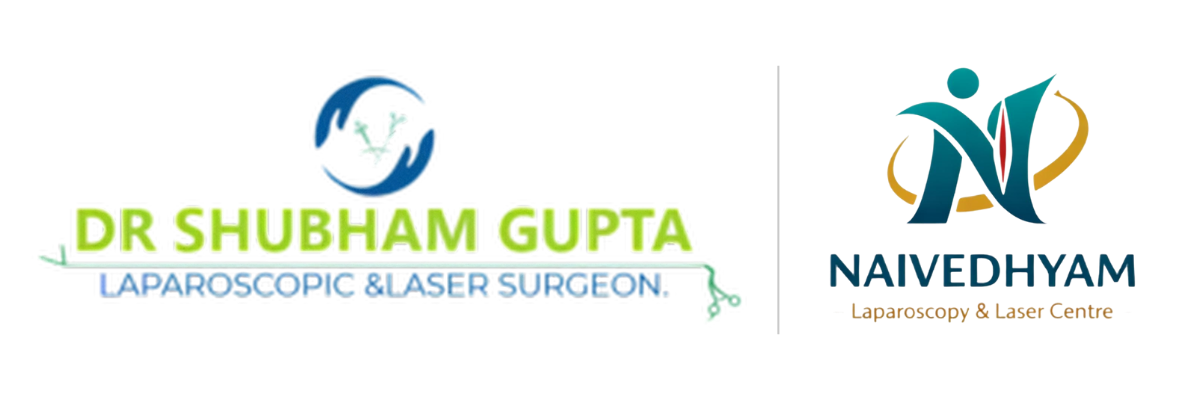If you are looking for a highly experienced Laparoscopic Surgery Specialist in Gwalior, Dr. Shubham Gupta is a trusted name. With extensive expertise in minimally invasive procedures, he combines modern surgical techniques with compassionate patient care, ensuring safer surgeries, faster recovery, and better outcomes.
What is Laparoscopic Surgery?
Laparoscopic surgery, also called minimally invasive surgery, uses a special instrument called a laparoscope — a thin tube with a light and camera — to see inside the body. Instead of making one large incision, the surgeon makes a few small cuts, each about 0.5–1 cm, to insert the camera and surgical tools. The high-definition video feed allows the surgeon to operate with extreme precision.
This technique is used for a wide range of conditions involving the abdomen and pelvis, including gallstones, hernias, appendicitis, abdominal tumors, and diagnostic evaluations.

Our Laparoscopic Surgery Services in Gwalior
1. Laparoscopic Gallstone Surgery
Gallstones can cause severe pain, nausea, and digestive issues. Dr. Gupta performs laparoscopic cholecystectomy, a minimally invasive gallbladder removal procedure that offers quick relief, tiny scars, and minimal discomfort.
2. Laparoscopic Hernia Repair
From inguinal to umbilical and incisional hernias, Dr. Gupta uses modern laparoscopic mesh repair techniques to strengthen the abdominal wall and prevent recurrence — with shorter downtime compared to open surgery.
3. Laparoscopic Appendectomy
Appendicitis requires urgent treatment, and laparoscopic removal ensures smaller cuts, faster recovery, and less post-operative pain compared to traditional methods.
4. Diagnostic Laparoscopy
For unexplained abdominal pain or suspected internal issues, diagnostic laparoscopy allows a clear view inside the abdomen without large incisions, helping in accurate diagnosis and timely treatment.
Benefits of Laparoscopic Surgery
Compared to traditional open surgery, laparoscopic surgery offers significant benefits that improve both the surgical experience and the recovery process:
- Minimal pain after the procedure due to smaller cuts
- Tiny scars that fade over time, offering better cosmetic results
- Lower risk of infection because wounds are smaller and heal faster
- Quicker return to daily activities — often within days instead of weeks
- Shorter hospital stays, with many procedures done as day-care surgeries
- Less blood loss during the operation
For patients, these advantages mean less disruption to daily life, quicker healing, and a smoother overall recovery.
Common Procedures Performed Laparoscopically
As a skilled Laparoscopic Surgery Specialist in Gwalior, Dr. Shubham Gupta performs a variety of minimally invasive surgeries, including:
- Gallbladder removal (Cholecystectomy) – for gallstones and gallbladder diseases
- Hernia repair – inguinal, umbilical, femoral, and incisional hernias
- Appendix removal (Appendectomy) – for appendicitis
- Diagnostic laparoscopy – to investigate abdominal or pelvic pain
- Intestinal surgery – for certain bowel conditions
- Liver and pancreas procedures – selected cases performed laparoscopically

Why Choose Dr. Shubham Gupta in Gwalior?
When it comes to laparoscopic surgery, the skill and experience of the surgeon are as important as the technology used. Dr. Shubham Gupta stands out for his:
- Extensive experience in a wide range of minimally invasive surgeries
- Advanced surgical equipment for precise and safe operations
- Patient-centered approach, ensuring you understand every step of your treatment
- Focus on faster recovery and minimal post-operative discomfort
- Comprehensive aftercare, from surgery to complete recovery
His reputation is built on successful surgical outcomes, patient trust, and compassionate care.
Preparing for Laparoscopic Surgery
Before any laparoscopic procedure, Dr. Gupta will perform a detailed health assessment. This may include blood tests, ECG, ultrasound, or CT scans to ensure you are fit for surgery.
Pre-surgery preparation tips:
- Discuss your medical history and current medications with your doctor
- Follow fasting instructions before surgery
- Arrange for a family member or friend to accompany you on the day of the procedure
- Ask all your questions so you feel confident and informed
Post-Surgery Care and Recovery
One of the biggest advantages of laparoscopic surgery is the quick recovery period. Still, following your surgeon’s instructions is crucial for best results.
Post-operative care tips:
- Take medications as prescribed to manage pain and prevent infection
- Avoid heavy lifting for at least 2–3 weeks
- Eat light, healthy meals that are easy to digest
- Stay active with short walks to improve circulation
- Keep the incision areas clean and dry
- Attend follow-up visits to monitor healing
Most patients are able to return to normal light activities within a few days and resume work within one to two weeks, depending on the type of surgery.
When to Contact Your Surgeon
While complications are rare, you should seek medical advice immediately if you notice:
- High fever or chills
- Severe pain or swelling
- Persistent vomiting
- Redness, discharge, or bleeding from the incision sites
- Shortness of breath
Early treatment of any concern ensures a safe and smooth recovery.
Laparoscopic surgery has revolutionized surgical treatment, offering patients faster recovery, less pain, and better results. Whether you need gallbladder removal, hernia repair, or another minimally invasive procedure, having an expert by your side is essential.
If you are looking for a trusted Laparoscopic Surgery Specialist in Gwalior, Dr. Shubham Gupta offers world-class surgical expertise with a caring, patient-focused approach.
(FAQs) About Laparoscopic Surgery
- Is laparoscopic surgery suitable for everyone?
In most cases, yes. However, certain health conditions may require open surgery. Your doctor will determine the best option for you. - How long will I need to stay in the hospital?
Many laparoscopic procedures allow patients to go home the same day or after an overnight stay. - Will I have visible scars after laparoscopic surgery?
The incisions are very small, so scarring is minimal and usually fades with time.



